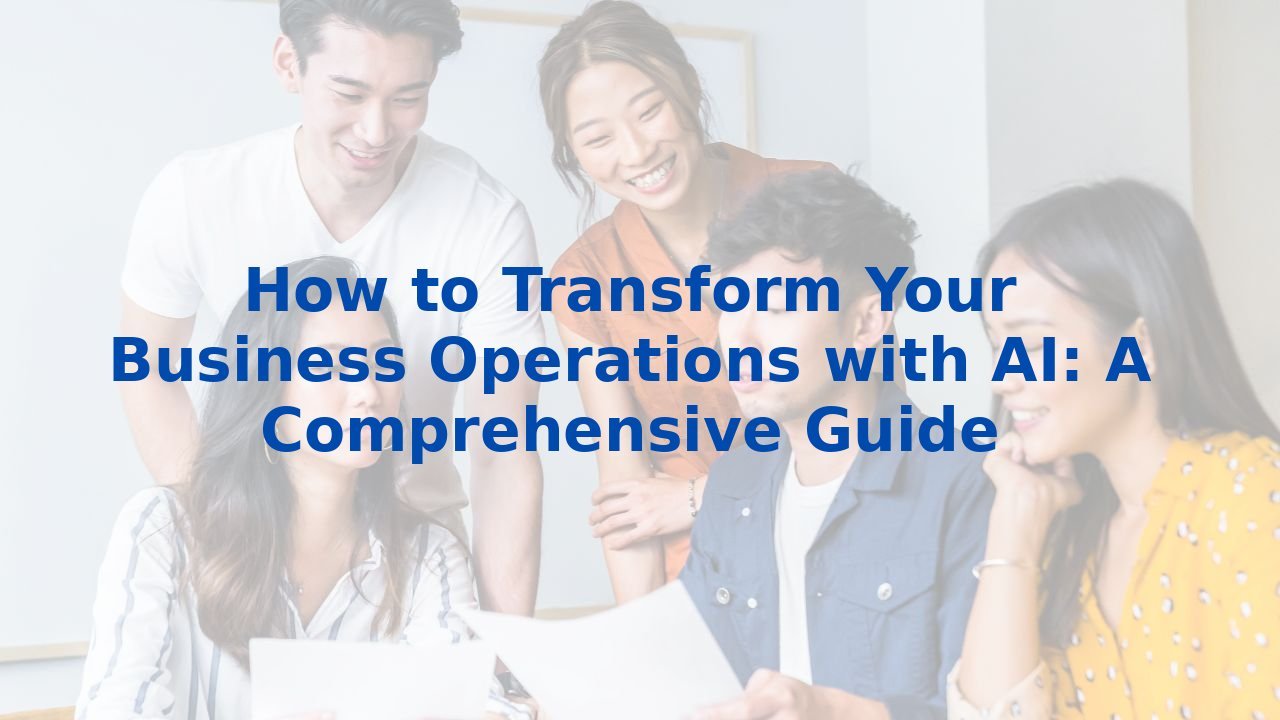How to Transform Your Business Operations with AI: A Comprehensive Guide
How to Transform Your Business Operations with AI: A Comprehensive Guide
In the ever-evolving landscape of modern business, the integration of Artificial Intelligence (AI) represents a pivotal shift towards optimizing operations and driving innovation. By embedding AI into various business processes, organizations are not only streamlining their operations but also fostering a culture of continuous improvement. Let’s explore the fundamental business processes where AI can make a significant impact and the benefits that come along with this transformation.
Redefining Business Processes with AI
AI operates not just as a tool, but as a strategic partner in redefining how businesses function. By reevaluating existing processes through the lens of AI capabilities, organizations can uncover opportunities for efficiency and innovation. This synergy is paramount in the digital age, where speed and adaptability are essential for survival.
Automation and Operational Efficiency
The capability of AI to automate mundane and repetitive tasks is perhaps its most celebrated feature. Think about daily operations—data entry, invoice processing, and appointment scheduling. These tasks, while necessary, consume a substantial amount of time and labor. AI takes these tasks off the hands of employees, ensuring not only higher accuracy but also a remarkable acceleration in workflow. This shift not only optimizes operational efficiency but empowers teams to direct their focus on strategic, high-value tasks. Effective automation transforms potential bottlenecks into streamlined processes, amplifying productivity and fostering an engine for innovation.
Advanced Data Analytics
Data is the backbone of decision-making, and AI amplifies its value exponentially. With its powerful data analytics capabilities, AI can sift through vast datasets, discerning patterns and extracting actionable insights. Imagine the competitive advantage—a retailer leveraging AI-driven analytics to predict inventory needs, thus reducing stockouts while minimizing excess inventory. Through foresight rooted in data, businesses can make smarter, strategic choices that maintain a competitive edge and respond dynamically to market demands.
Customer Experience Personalization
In a marketplace that thrives on personalization, AI is the key that unlocks deeper customer connections. By meticulously analyzing consumer behavior and preferences, businesses can craft tailored experiences that speak volumes. Consider AI-powered chatbots that provide personalized support at any hour. These sophisticated tools not only elevate customer satisfaction but also foster loyalty—a vital currency in today’s market. With AI, businesses can cultivate relationships that are not only transactional but also relational.
Security and Risk Management
The digital age brings with it heightened vulnerabilities. However, AI equips organizations with the tools needed to safeguard against threats. Rapidly detecting anomalies and flagging potential cyber threats, AI acts as a vigilant guardian of sensitive data. By implementing AI in security protocols, businesses can diminish the window for risk and create a safer environment for their operations and customers alike.
Innovation and Product Development
Pioneering companies understand that innovation is the lifeblood of success. AI enhances innovation processes by refining accuracy from design to implementation. By leveraging historical data, organizations can not only anticipate consumer demand but also tailor their production schedules accordingly. This predictive approach allows businesses to minimize operational inefficiencies and carve out a path toward more agile development cycles. In the race against competitors, AI acts as a catalyst for sustained innovation.
Benefits of Training Employees for AI
While AI presents remarkable opportunities, it’s essential to highlight the necessity of equipping employees with the skills to harness these technologies effectively. Implementing robust training programs is crucial for ensuring employees feel empowered in this AI-augmented landscape. By focusing on competencies such as data interpretation and the use of AI tools in decision-making, organizations can enhance the synergy between their workforce and AI systems. This proactive approach minimizes resistance to change and optimizes the transition to a new operational model, ensuring a more cohesive adaptation to an automated future.
Conclusion
As we conclude our exploration of AI’s transformative power within business operations, it is clear that embracing this technology is not merely a trend but an imperative for forward-thinking organizations. By automating workflows, enhancing data analytics, personalizing customer interactions, managing risks, and fostering innovation, businesses are poised not only to survive but to thrive in a digital-first world. Coupled with meaningful employee training, the potential benefits are boundless, setting the foundation for long-term growth and profitability.
Ultimately, the journey towards integrating AI is one of redefining what’s possible. As your business steps into this new paradigm, remember that AI isn’t just a tool—it’s a way to revolutionize not only your operations but also your vision for the future.
Learn more about how to equip your entire workforce with AI skills and embark on this transformative journey at Complete AI Training.



